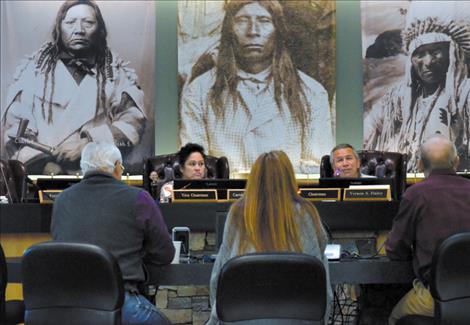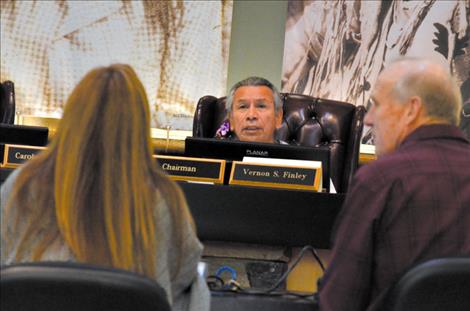Two governments discuss county funding
Hey savvy news reader! Thanks for choosing local.
You are now reading
1 of 3 free articles.
PABLO – Lake County Commissioners attended a Confederated Salish and Kootenai Tribal Council meeting on Thursday to ask if the council plans to supplement the county for lost tax revenue of about $1 million from what will soon officially be named the Salish Kootenai Dam.
Tribal Council Chairman Vernon Finely explained to the commissioners that the tribe did not anticipate receiving enough revenue from the dam to disperse to the county, although they had looked for possibilities.
“We aren’t going to have the revenue off of the dam to make up for tax loss,” he said adding that the tribe hopes the hydroelectric project is able to fund operational costs and break even monetarily. Low projected energy prices have caused the tribe to prepare for reduced revenue from the dam.
Tribal Council Vice Chair Carole Lankford sympathized with commissioners, saying she understands the loss to the Polson School District, which is around $650,000 from tax revenue formerly collected from the dam.
“We all have children in school,” she said, adding that this is a route she hoped the council didn’t have to take, but they had to look at the dam from a business standpoint and make sure that it is stable.
Lake County Commissioner Ann Brower said the loss of revenue from the dam has to be made up by every taxpayer. She encouraged the tribe to consider the county when future funding is available.
Tribal Chairman Finley stated that the tribe is interested in helping the county with projects that benefit the entire county through funding sources that could include grants. He said combining tribal and county resources on many projects would benefit many communities.
Tribal council members asked the commissioners to share project ideas for possible collaboration in the future during the meeting. Preventing aquatic invasive species from infesting the lake was one of the issues. The density map was discussed as a project. Commissioner Bill Barron said the county could use help with a road project.
County Commissioner Gale Decker also wanted to use the meeting to “open the door for other sessions” to discuss issues related to the county. He voiced the need for more communication and collaboration between the commissioners and the tribes.
“(We need to) bring our two governments together to work cooperatively,” he said. “We are not always going to see eye to … but that doesn’t mean we can’t find ways of reaching a solution.”
Tribal Chairman Finley agreed that more communication is needed. He added that historically the two groups haven’t always worked well together but he hopes that changes. He agreed to quarterly meetings between the tribal council and the commissioners to help build that relationship.
In the lobby of the tribal complex after the meeting, the commissioners talked about their next plan to try and procure lost funding for the county, which is to increase the number of tax mills or make cuts. The lost revenue received by the Polson School District only affects that district. Commissioner Barron said the county won’t see a financial “crunch” until next year.
“The bills are paid for now,” he said.
Besides increasing mills, making cuts to programs is another option, although many of the programs don’t have room for cuts.
“The only way to do it is to cut employees,” Commissioner Decker said of some of the county programs. Although, he added that larger businesses being developed in the county will increase the amount of tax revenue for the many services the county funds. Issues surrounding funding should change in the next few years.
“Once we get through these two years it will level out,” Barron said.
The county lost the ability to tax the dam after it was purchased by CSKT in an agreement that started 30 years ago with the Montana Power Company. As a sovereign government, the tribe is not required to pay property tax. CSKT Communications Director Robert McDonald explained the tribe’s tax exempt status in a press release.
“Now that the hydroelectric facility is held in trust by the U.S. Government for the Tribes, the property cannot be taxed by the state, or by extension — the county,” he said
McDonald said that although the tribe is not able to supplement the lost tax revenue from the dam, they do contribute to communities across the reservation in many other ways on many projects that include land us, tribal wilderness access, water and air quality programs, law enforcement and low-cost energy from Mission Valley Power.
“CSKT will also continue as a significant economic driver and member of the business community: CSKT pays $40 million to local vendors (for goods and services) each year and is the region’s largest employer with 1,200 employees and an annual payroll of approximately $40 million,” he said. “Other tax payments are still made to Lake, Sanders, and Missoula Counties.”
Many programs utilize tribal lands at little to no cost.
“Local projects receive CSKT support to benefit the entire community such as the approval of three community wells allowed on Tribal lands at no charge, baseball fields in Arlee, St. Ignatius, Charlo, and Ronan on Tribal property at no charge, and fire stations on tribal land for a $1 a year in Big Arm, Pablo, and Arlee,” he said.
Funding is also allotted for projects involving infrastructure.
“The Tribal Roads department contributes millions of dollars in bridge replacement and road improvements,” he said. “The Tribes have donated gravel to assist with county road projects.”
McDonald said the tribe hopes to invest more funding in the communities as it becomes available.
“The Dam’s acquisition is a major Tribal investment and the Tribes have taken great steps to ensure its success,” he said. “When that success manifests and grows, the Tribal Council remains committed to be a generous neighbor that helps support essential services.”

















